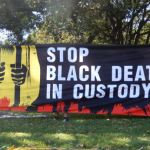The Right to Protest: A Thing of the Past

Protesting has long been a way for people to publicly express their views and demonstrate their grievances. It has achieved a great deal since the late 1800s; from workers rights to female suffrage, and from civil rights to environmental protections.
But around Australia, legislators are constantly looking for ways to suppress this important form of expression.
We have previously published a blog and posted videos on our YouTube channel about that fact that residents in NSW do not have a right to protest, and that they can face a criminal record and even a prison sentence for participating in an “unlawful assembly” – which is any public gathering that is not approved by police or a court, peaceful or otherwise.
Now in Western Australia, protesters are facing even greater restrictions with legislation currently in parliament that could see the state introduce the toughest laws in the country.
Proponents of the laws
Liza Harvey, the WA Police Minister, claims that current criminal laws do not constitute enough of a deterrent for protesters, and a WA government press release promoted the proposed laws on the basis that they will prevent “dangerous protesting.”
To justify the laws, Harvey highlights the disruptive and frustrating methods used by some protesters to ensure they can’t be removed from their point of protest, such as thumb locks and barrel locks.
According to WA Attorney-General Michael Mischin, thumb locks make it impossible for protesters to be removed from sites. Thumb-locking essentially involves pouring freezing cold water on your thumb to cause it to shrink, then placing your thumb inside a locking device until it returns to normal size and becomes too large to remove. It usually requires the intervention of a skilled technician to remove a person from the device.
Barrel locks work in a similar way. They involve cutting a hole in a barrel, putting your hand inside, then holding onto an item into the barrel so that your fist cannot fit back out.
Both techniques can be dangerous to protestors and time-consuming to remove.
The proposed laws are amendments to the WA Criminal Code creating two new and related offences.
The first offence is the “physical prevention of lawful activity”. Its intended purpose is to ensure that workers and management at sites where protesters may congregate are not disturbed.
The second is to “manufacture or possess anything that is suspected to be used in order to prevent lawful activity”. These things can then be seized by police.
Criticism of the laws
Civil libertarians warn that the laws impinge upon an extremely important democratic right – the right to protest – which is fundamental to any healthy society.
They point out that the laws essentially reverse the onus of proof – for example, requiring a defendant to prove that they did not intend to “prevent lawful activity”, rather than requiring police to prove that they did. This, they argue, is a direct contravention of an important safeguard in democratic society – the presumption of innocence
They also criticise the breadth of the legislation, particularly the use of the word “thing”, suggesting that the legislation may be unconstitutional on the basis of uncertainty.
Hugh de Kretser from the Human Rights Law Centre believes that police already have sufficient powers to monitor protests. He points out that offences such as trespass, property damage and breach of the peace can be against those who go too far.
Police can additionally use move-on orders to get protestors to leave a public place if they suspect they are preventing or hindering the lawful activity of another person.
Tough penalties
The penalties for committing either offence are particularly harsh.
Intentionally or physically preventing a lawful activity is punishable by 12 months imprisonment and a fine of $12,000. If the conduct puts anyone at risk – including the defendant themselves – the penalties double, meaning the maximum penalty is two years imprisonment and a fine of up to $24,000.
Even making, adapting or knowingly possessing “a thing” which could be used to commit the above offence is punishable by 12 months imprisonment and a fine of $12,000. With this offence too, intention is presumed and the accused must disprove it in court.
In addition, if a person is convicted, a court can order the person to pay some or all of the expenses that were caused removing any physical barrier that they created or maintained.
This applies regardless of whether the expenses were paid by the police or a person whose lawful activity is prevented by the offence.
A growing trend
Unfortunately, new laws that prevent freedom of expression and impinge upon important rights and safeguards are more and more becoming the norm in the Australian criminal justice system, rather than the exception.






